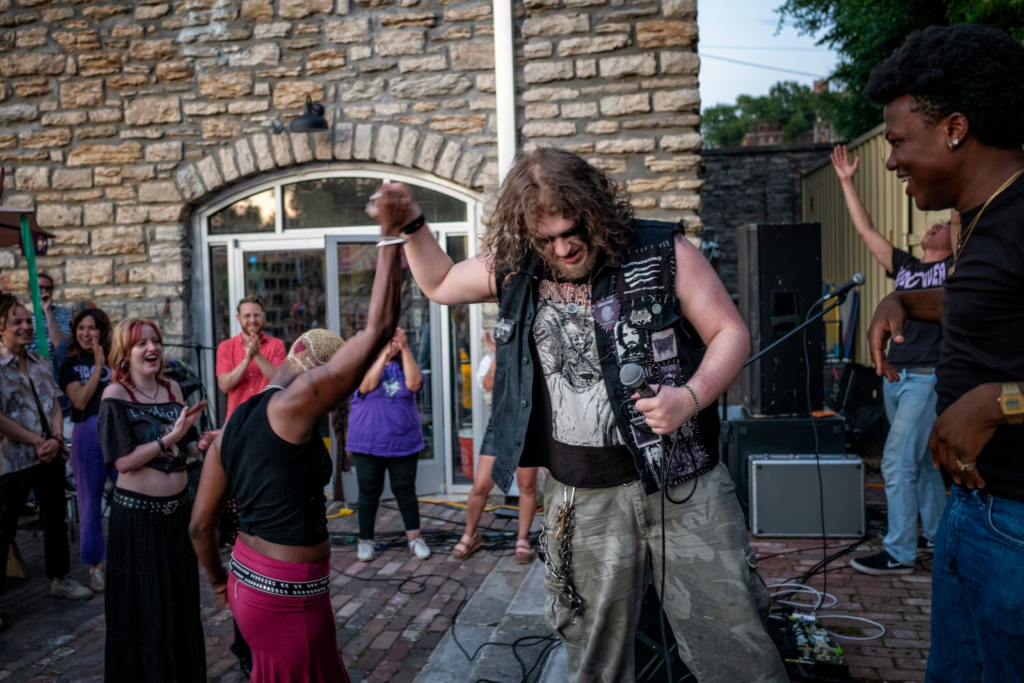Chicago Hope

Though it was written and is set in the late 1950s, Lorraine Hansberry’s A Raisin in the Sun is still relevant when it comes to certain African-American experiences today. Hansberry’s prescience was staggering, and her play is one of those classics that caters to all without talking down to any.
The InPlay production at Just Off Broadway does it justice. Within the first ten minutes, it’s clear that the actors portraying the members of the Younger family are working at a level of blistering honesty.
As the house lights dim and the stage lights come up to reveal the Youngers’ cramped apartment on Chicago’s South Side, a sample of the song “Bridge Over Troubled Water” fades into a police siren. The musical selection is anachronistic, but the message is not; this neighborhood has seen better days. And as the play goes on, it seems as if the unspoken word on the street is that there’s got to be a better way.
One Friday morning, Ruth (Tiffany Sipple) wakes up her growing boy, Travis (Mikhail Wheeler), and her husband, Walter Lee (George L. Forbes), who’d rather be anywhere but en route to the chauffeur job he hates. Walter Lee’s sister Beneatha (Teisha M. Bankston), a premed student, is also astir, and the fight for the single bathroom is on. The same routine plays itself out across America every morning, yet Hansberry offers subtle hints that something is amiss. When Ruth asks her husband how he wants his eggs — she’s already whipping yolks and whites into a froth — he pointlessly responds, “Not scrambled.”
Before breakfast has cooled, the recently widowed mother of Walter Lee and Beneatha enters the room with a slow shuffle that belies her rigorous rule of the roost. Lena (Lynn King) is outwardly harmless, but she has a knack for pouring salt into wounds her family doesn’t know it has. When she sees that Ruth is cooking eggs for Travis, Lena is compelled to say, “I noticed he had cold cereal all last week.” There’s a bit of stereotypical carping at the mother-in-law here, but Hansberry’s writing transcends it; one more line in the scene would have made the exchange redundant.
Amid all this surface normality, there’s a palpable buzz — that’s because a $10,000 insurance check is due the next day as a result of Mr. Younger’s premature death. The only certain agenda for the money is to supplement Beneatha’s medical-school tuition. Walter Lee, however, is one argument shy of convincing Lena that another chunk should be invested in a dubious franchise of liquor stores. Being a good Christian, Lena is averse to fronting something so vulgar; instead, she has a vague notion that there’s a house somewhere in the suburbs with the Younger name practically painted on the mailbox.
These building blocks are laid in the first two scenes of the first act; as developments play themselves out, directors Jacqee Gafford and Vernice Wesley exhibit a nearly flawless understanding that, with one false move, the play can teeter into melodrama. Admirably, only one scene approaches that precipice, one in which orchestral music underscores an exchange between Lena and Ruth. The music is superfluous; King and Sipple need no artificial emotional accompaniment.
King bravely inhabits the soft and the barbed extremes of Lena’s paradoxical nature. When Lena is caught in a lie, she visibly crumbles. Sipple’s performance is splendid, both studied and quiet but never mannered or boring. Other actors demonstrate similar range. At one point the script describes Walter Lee as a volcano, and Forbes wears that like a badge. Later, Forbes aces Walter Lee’s childlike fragility, too. And Bankston plays Beneatha as an upwardly mobile young black woman who doesn’t hide the attitude that her family is beneath her. That the character remains likable and funny is another accomplishment in a show that bursts with them.
Though Raisin deserves a long run of its own, InPlay is alternating its performances with a new play by Penny Weiner called Fallout. Weiner, a theater professor at Topeka’s Washburn University, has created a solid blueprint for a worthwhile drama that, here, unfolds like a first draft. If Weiner would only edit it to move a little more briskly, the piece could join that new canon of plays about post-9/11 America.
The setting is Thanksgiving 2001. Breaking bread in a Pennsylvania college town are Julia (Vickie S. Little), a fiftyish single woman; Emily (Mary Oglesby), her quasi-goth niece; and Essam (Berrigan Willmott), a Ph.D. candidate who’s of Egyptian descent, though he was born in the United States. Essam has rented a room from Julia for two years; a flashback to the previous Thanksgiving reveals the same threesome, a little tipsy, expressing unity with an impromptu dance to “We Are Family.”
Soon enough, though, we hear the phrase “when the second plane hit,” immediately returning to a present in which dark foreigners like Essam have provoked a new paranoia. Weiner is smart, though, to include a reference to a racist incident Essam experienced before 9/11, reminding us that words such as raghead weren’t invented that day. Julia’s story is fascinating as well; she was in the South registering blacks during the civil rights movement — or was she? The cast is interesting to watch as it raises the parallel between these two characters, but the playwright is more familiar with using multiple flashbacks than she is adept at it. Still, the play has sparks that merit more flint.




